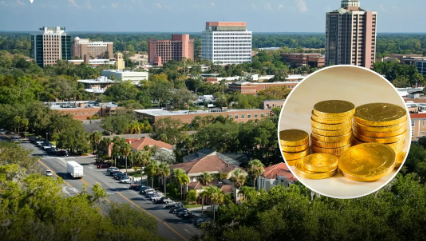Florida is set to take a historic leap toward “hard money” with Governor Ron DeSantis’s signing of a landmark bill that recognizes gold and silver coins as legal tender. The legislation, CS/HB 999, which passed with bipartisan support, positions Florida as the largest state to formally incorporate precious metals into its economic system as a constitutional form of money.
The new law, signed on May 27, 2025, is scheduled to take effect on July 1, 2026, pending legislative ratification of the regulatory framework. The move is a significant win for “sound money” advocates who seek alternatives to the U.S. dollar, citing concerns over federal monetary policy, inflation, and centralized currency control.
The new law introduces several key changes aimed at making gold and silver functional currencies:
- Legal Tender Status: Specific gold and silver coins meeting strict purity standards (99.5% for gold and 99.9% for silver) will be officially recognized as legal tender for settling debts incurred on or after the July 2026 effective date.
- Sales Tax Exemption: The bill immediately eliminates all state sales taxes on qualifying gold and silver coins, a crucial step to remove the disincentive of using precious metals for daily transactions.
- Voluntary Adoption: The use and acceptance of gold and silver as currency is entirely optional. No person or entity, including state or local governments, is compelled to accept them.
- Modernizing Transactions: The law paves the way for the development of electronic transfer systems to allow businesses and individuals to transact using precious metal-backed accounts.
- Purity and Regulation: The law requires coins to be clearly stamped with their weight, purity, and mint of origin. The Florida Chief Financial Officer and Financial Services Commission are tasked with developing a comprehensive regulatory framework by November 2025.
Governor DeSantis framed the legislation as an act to protect financial autonomy, stating that it “gives Floridians an honest option beyond fiat” and provides inflation-proof assets to safeguard wealth.
While Florida is making a bold move, it is not the first state to pass such legislation. Utah became the first state in modern history to make gold and silver coins legal tender in 2011. Since then, over a dozen other states, including Wyoming, Arizona, and Oklahoma, have passed similar measures to eliminate sales taxes or recognize precious metals as currency.
However, Florida’s size and economic influence make its adoption of “hard money” legislation particularly impactful, bolstering the national trend toward currency decentralization. As one analyst noted, this action affirms the essential freedom to choose a sound and stable currency.
The next major milestone for the law is the legislative review of the proposed rules by the end of 2025 and the final ratification process in the 2026 legislative session, which will determine if the system is fully operational by the July 1, 2026 deadline.







